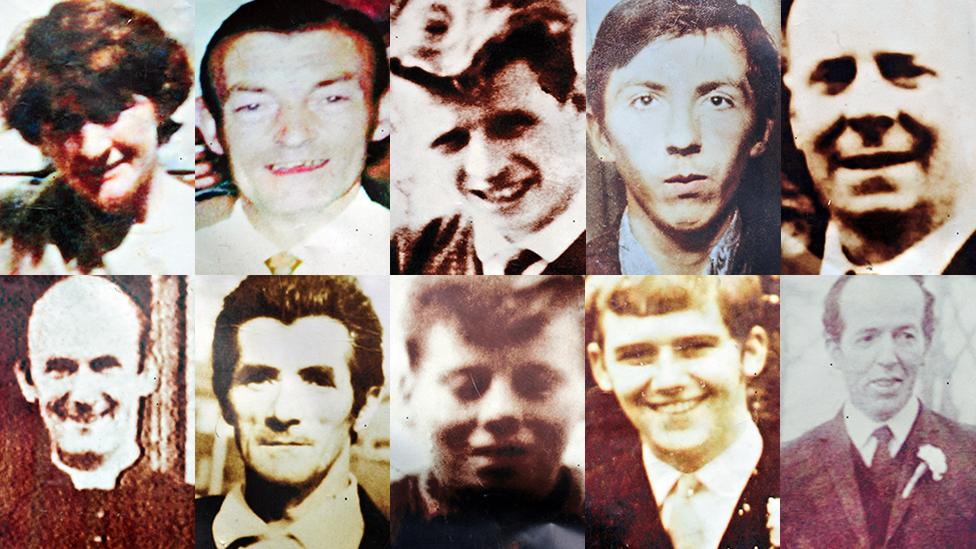Ballymurphy families continue to describe their loved ones
- Published

Nine men and a woman were killed in Ballymurphy in August 1971
The last two families of those killed in Ballymurphy almost fifty years ago have been describing the loved ones they lost.
It brings to 10 the number of families who have had their say at the inquest into the deaths in August 1971.
The killings happened during an Army operation in which paramilitary suspects were detained without trial.
At the time, the Army said the victims were either IRA gunmen or were caught in the crossfire.
On Thursday, there were statements about 20-year-old John Laverty, killed on the Whiterock Road, and 49-year-old John McKerr, killed in the Ballymurphy estate later the same day.
These days in court have been very important to each of the ten families, a chance to describe the person they lost, and how the death affected their family.
Carmel Quinn spoke of her brother John Laverty, describing him as "not just another statistic of the conflict".
"We lost our brother but we also lost our Mummy and Daddy," she said.
"Their grief was added to by the lies they read in the paper about their son, they functioned, but their hearts were too sore to find any joy."

Who were the victims?
The families of those killed in Ballymurphy in 1971 have been giving moving accounts of their relatives since the inquest began in November.
The victims were:
Father Hugh Mullan, 38, and Francis Quinn, 19, were shot in an area of open ground behind Springfield Park
Daniel Teggart, 44, Joan Connolly, 44, Noel Phillips, 19 and Joseph Murphy, 41, were shot near the Henry Taggart Army base near Springfield Park
John Laverty, 20, and Joseph Corr, 43, were shot at separate points at the top of Whiterock Road
Edward Doherty, 31, was shot at the corner of Brittons Parade and Whiterock Road
John McKerr, 49, was shot outside the old Corpus Christi Parish

Anne Ferguson told the court about her father, 49-year-old John McKerr.
Mr McKerr was a former British soldier who had served during World War Two.
"He was proud of his military career and was a member of the British Legion. He would not have wished to be associated with any paramilitary or terrorist organisation," his daughter Anne told the court.
Lost hand in WW2
She also explained that reports he had been holding a gun were wrong.
In fact, he had lost his right hand fighting in the war and used a metal prosthetic hand.
Ms Ferguson explained that her family wants to find out the truth, not to have anyone punished.
The court will now move on to hear direct evidence about what happened in each case in those three days in August, 47 years ago.
Meanwhile a soldier has applied for anonymity and screening at the inquest.
Referred to as "Witness M3", the man is believed to have evidence related to the shooting of 31-year-old Edward Doherty.
Mr Doherty was killed on the Whiterock Road near an anti-internment barricade on 10th August 1971.
Described as a "substantial application" the soldier's submission includes documents and medical certificates provided to the court in recent days.
The coroner, Mrs Justice Keegan told the court she would rule on the application soon.
- Published11 May 2021

- Published19 November 2018

- Published14 November 2018
